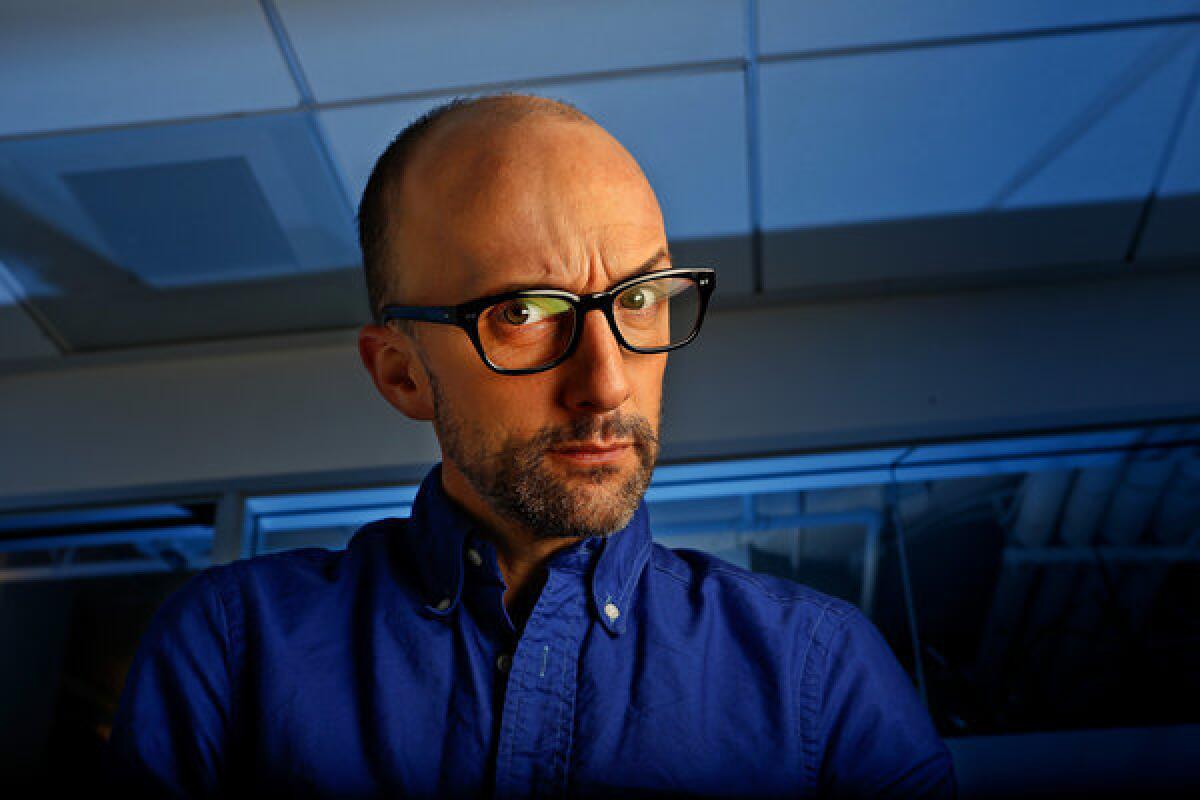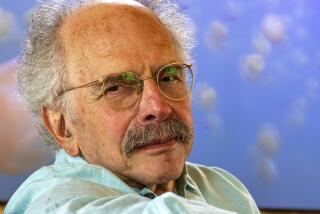Jim Rash writes, directs, acts and hosts.

Oscar-winning screenwriter Jim Rash (“The Descendants”) hosts Sundance Channel’s series “The Writers’ Room,” a chatfest with scripters of such hit TV shows as “Game of Thrones,” whose staff sits down with Rash on Monday. Rash also plays the energetic Dean Pelton on NBC’s “Community,” which has been picked up for a fifth season.
How did “The Writers’ Room” come about?
It was a creation with Sundance in partnership with Entertainment Weekly, and they came to me wondering if I’d be interested in hosting a show that was an open panel discussion about the act of writing and particularly the inner workings of a writing staff on popular television shows. How do they come up with stories, what do they do when they write themselves into a corner? As a writer myself and a lover of these shows, I was in from the idea.
INTERACTIVE: Fall 2013 TV preview
It’s a cliché to say that Hollywood undervalues writers, but I’ll say it anyway.
Why not? We’ll own it.
But do you think that’s more the case in film where writers have less clout than they do in TV, where they often double as producers?
I think it’s fair to say that that’s the big difference between the two. In television, the writer-creator-showrunner is embraced as the creative mind. Obviously directors come aboard, but they’re still working in tandem with said writer and creator, as opposed to a movie, which can often turn over your work; you could be left out of the loop for sure.
How much do you think the dual role that writers have in television has to do with TV’s renaissance, in contrast to what some people, like Steven Spielberg, have described as movies’ decline?
I think we have to equate quite a few things, from the creator and writer and also the number of outlets that [air] TV shows like “Breaking Bad” and “Dexter” and “The Wire” and “Homeland.” The fact that there are so many cable outlets as well as networks or pay cable, there are places for these writers to tap into some new territory, some characters that are complex and morally questionable and maybe a little bit darker. On the movie side of things, the difficulties come with so few movies being made, and when they are, it seems that it’s a marketing game. Story sometimes takes a backseat to that one grand marketing idea.
PHOTOS: Celebrities by The Times
In one episode, “Parks and Recreation” creator Michael Shur says, “Writers’ lives and actors’ lives are open books.” And segueing to your most recent film, “The Way, Way Back,” it seems as though you and/or your writing partner, Nat Faxon, had a pretty miserable childhood. The opening scene where Steve Carell tells Liam James’ character that he’s a three out of 10, that really happened to you?
Yes, that first scene. Carell is playing the boyfriend, but the actual guy was my stepfather at the time. I was 14 and I was in a station wagon just like Duncan [James] is in the first scene of “The Way, Way Back,” and we were on our way to our summer vacation, and he asked me what number I thought I was, and I said six and he said three. And basically he went on to say I wasn’t taking advantage of all the opportunities in this lake area, that I just stuck around them and the house and didn’t get out there and meet people. That’s why I enjoyed using it, because looking back, I understood what he was saying, but as a 14-year-old kid, all you hear is the number three. And although we’re all shocked by it, it really was cathartic — now you can look back and have this different view of something and you’re able to write to that.
What did winning the Oscar do for your career?
Getting a movie made is very difficult right now. We wrote “The Way, Way Back” eight years ago, and it went on this very classic Hollywood journey of, it’s going to be made, it’s not going to be made, up and down, different directors, all that. And it got to this place where, in TV and film there’s this danger zone where something sits on the shelf too long and it’s hard to convince someone that it’s still great. The Oscar definitely allowed us to reopen that and get heard just enough to convince some people that we could direct it and give us a tad bit of money.
PHOTOS: Hollywood backlot moments
Looking to the future, “Community” — with creator Dan Harmon returning after being gone for a season, what will we see in Season 5?
One, we’re elated that both Dan and [co-executive producer] Chris McKenna are both back. Whether this is the end chapter or there’s more to come, who knows? We just know they’re fueled and excited and renewed.
Literally and figuratively.
Yes. One of the great things Dan was able to do was balance character arcs within classic “Community” insanity and keep that part of it grounded. So I feel like he’s going to do a little reset in the way of establishing these characters and voices again.
I’ve read that you and Nat are directing Fox’s pilot of “Fatrick.”
We knew [“Don’t Trust the B---- in Apartment 23” co-executive producer] Corey Nickerson for many years, and she and [executive producer] Nahnatchka Khan had pitched a show they had called “Fatrick.” We meet Patrick, who’s in his 30s and attractive and fit. He was an obese kid and labeled Fatrick. And it’s about how that affects him now as a grown adult, but it will almost be seen as dual time lines. We loved the idea.
Are you still writing an action comedy for Kristen Wiig?
Yes. We came from the Groundlings with Kristen and we’ve been friends forever and wanted to write something for her. And I love the Coen brothers’ “Raising Arizona” to no end, the eclectic characters, the darker tone. We’re doing that sort of movie, which I think will be a nice departure for her.
More to Read
The biggest entertainment stories
Get our big stories about Hollywood, film, television, music, arts, culture and more right in your inbox as soon as they publish.
You may occasionally receive promotional content from the Los Angeles Times.






